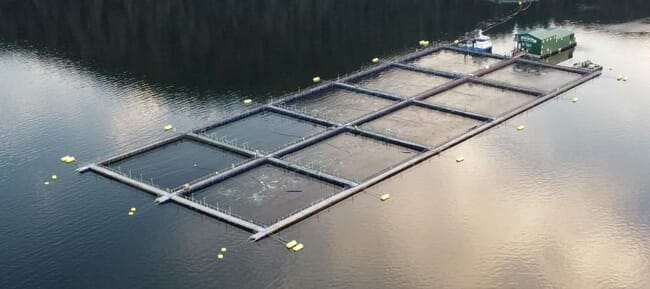
The decision to close 19 open-net salmon farms in British Columbia’s Discovery Islands was made in 2020 by then fisheries minister, Bernadette Jordan © BCSFA
In a letter signed by several agricultural organisations as well as the Canadian Aquaculture Industry Alliance (CAIA), they argue that: “Salmon farming touches all aspects of Canadian farming and food production, including food retail and service, food banks, food processors, feed manufacturers, and grain growers. Over 3,000 distinct companies supply the salmon farming sector and its economic activity supports the critical infrastructure of many coastal, Indigenous, rural and urban communities. Canadian salmon feed companies purchase close to $150 million annually from Canadian grain and protein suppliers, supporting a circular economy with the potential for significant value-add growth.”
The letter – addressed to Prime Minister Justin Trudeau, opposition leaders, various relevant federal ministers and all provincial premiers – details how federal government decisions have already shut down 40 percent of salmon farms in BC since 2020. It calls for support in reversing this trend and scrapping plans to “transition” all conventional salmon farms into land-based alternatives, before Federal Fisheries Minister Joyce Murray presents the latest options for the transition framework to the federal cabinet.
According to the signatories to the letter, such a transition is already “making groceries more expensive for Canadian families, increasing carbon emissions and wiping out jobs that are the lifeblood of rural, coastal and Indigenous communities”.
“These shutdowns were not based on science but on politics and claims by activists that salmon farms are harming wild salmon, which has been proven false through rigorous peer-review science evaluation processes under the Department of Fisheries and Oceans,” they argue.
“Simply put, we need to grow more food in this country to feed Canadians and the world and continue to grow it better. Grounded in evidence-based policy, it is Canada’s obligation to deliver the best, sustainable, high-quality and affordable food to Canadians, while also growing jobs, driving economic growth and supplying this food to the world,” they conclude.
Signatories to the joint letter include: Animal Nutrition Association of Canada, Canadian Aquaculture Industry Alliance, Canadian Aquaculture Suppliers Association, Canadian Federation of Agriculture, Canada Grains Council, Canadian Meat Council, Canola Council of Canada, Coalition of First Nations for Finfish Stewardship, and CropLife Canada.



